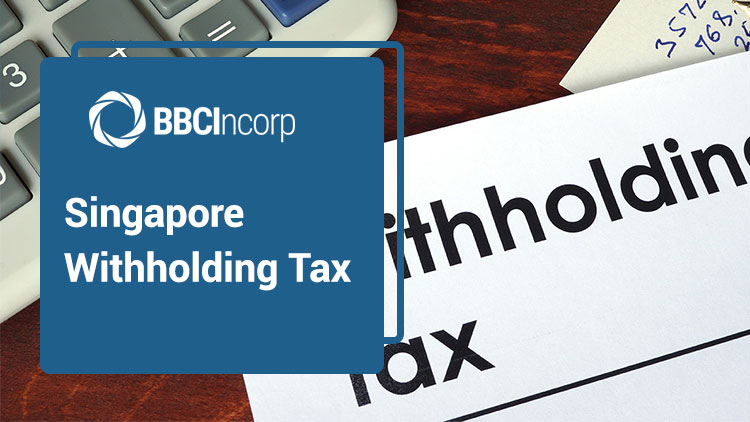
- 1. What is the withholding tax in Singapore?
- 2. Who needs to pay withholding tax in Singapore?
- 3. Who are non-residents in Singapore?
- 4. Payments that are subject to withholding tax in Singapore
- 5. Payments that are exempted from withholding tax in Singapore
- 6. Deadline for paying withholding tax in Singapore
- 7. Penalties for failure to pay withholding tax in Singapore
- 8. Double taxation avoidance with Double Tax Agreements
If you work for less than 183 days a year in Singapore, you will be labeled a “non-resident” and withholding tax will automatically apply. The same holds true for companies that are managed mostly outside of the city-state.
For a newcomer, regarding Singapore taxation, withholding tax may be one of the most confusing types to understand. Let’s learn more about what it is and what types of income are subject to such tax in Singapore.
1. What is the withholding tax in Singapore?
A withholding tax is the percentage of the payment made to a recipient that is withheld by the payer and then is remitted right to the government for tax purposes.
Here is how withholding tax works.
One receives remuneration for the services or works one renders. However, rarely is this payment fully received. A percentage of it will be deducted at source and be remitted right to the government. The amount deducted is referred to as withholding tax.
2. Who needs to pay withholding tax in Singapore?
The withholding tax in Singapore is only applied to Singapore-sourced income earned by non-resident individuals or companies. And Singapore residents are completely spared of this obligation.
These non-residents are liable to pay various rates of withholding tax on various categories of payments, which are boiled down to the following:
- Income derived from the works and services rendered within the territory of Singapore.
- Certain types of specific payments that are detailed in the Income Tax Act. Different types are subject to different rates.
In what follows, we will go deeper into how non-residents are defined, which kinds of payments on which withholding taxes are levied, when one needs to pay it and other pertinent information about withholding tax.
3. Who are non-residents in Singapore?
Non-resident individuals can be roughly defined as those that present in Singapore for less than half a calendar year, whereas non-resident companies are businesses that are administered and run mainly outside of Singapore.
3.1. Non-resident individual
A non-resident individual is one who could demonstrate his/her physical presence in Singapore for less than 183 days. During this course, this person should actively render services and/or works that derive incomes.
Non-resident individuals is further categorized in three broad groups in accordance with the types of service provided: non-resident professionals, non-resident public entertainers and non-resident directors.
The label “non-resident professional” is applied to the following types of professionals:
- Any foreign professionals, experts or specialists employed by government bodies, statutory boards, private organizations to invest their expertise into Singapore
- Foreign speakers or academics organizing seminars or workshops held in Singapore
- Queen’s Counsels
- Consultants, trainers, and coaches
- An individual operating through an unincorporated foreign firm
For the most part, non-resident professionals would be subject to a withholding tax rate of a flat 15% on the gross income they earn from a Singapore source.
However, this rate is not applied to all.
One exception is that of public entertainers. At the time this article is published, services rendered by these individuals are subject to a comparatively low rate of 10%, thanks to the sharp cut in early 2010. But do note that this rate is set to increase back to the standard 15% on 31 March 2020.
Non-resident directors of a company incorporated locally in Singapore are also subject to a rate different from those of others. According to IRAS, an amount equal to 22% would be withheld from the remunerations of these well-paid individuals.
The location where the professionals render the services is also a key factor determining whether or not he/she is subject to withholding taxes. So one would be included as a candidate for withholding tax if he/she provides services in Singapore yet lives in a foreign country.
3.2. Non-resident company
A non-resident company is simply one whose management and control are conducted mostly outside of Singapore.
“What do control and management mean?” you may ask. Since this term is too broad and therefore could signify anything. Yet IRAS locates “control and management” within the scope of strategic matters such as decision-making and BOD meetings. So if a company mainly conducts these activities overseas, it is seen as a non-resident.
What follows are some of the cases in point of non-resident company:
- A branch office of a foreign company as it is controlled and managed by a party located outside of Singapore
- A company conducting its core business activities in Singapore yet incorporated in a foreign country and managed by its foreign parent company
4. Payments that are subject to withholding tax in Singapore
Some of the most common payments for non-resident companies on which withholding taxes are imposed and its current rate are as follows:
- The interest, commission, and fee to cover any payments related to loan or indebtedness are subject to a rate of 15%
- Royalties or other payments for the use of or the right to use any movable property are subject to the rate of 10%
- Rent or other payments for the use of any movable property are subject to the rate of 15%
- Payments for the use or the right to use intellectual properties are subject to 10%
- Management fees are subject to 17%
- Technical assistance and service fees are subject to the rate of 17%
Types of payment to non-residents individuals within the scope of withholding tax and their respective rate are presented below:
- Payments to non-resident directors that are subject to a withholding rate of 22% include salary, bonus, director’s fee, accommodation provided from any payer, gains from stock options or share ownership plans.
- Payments to non-resident professionals subject to 15% on gross income or 22% on net income comprise professionals’ fees, accommodation, airfare or transport reimbursed or provided by employer, allowance and per diem.
- Payment to a non-resident public entertainer is subject to 10% until 31 Mar 2020 and 15% thereafter on gross income including all types of cash and non-cash payments except airfare and accommodation for service engagement of no more than 60 days.
5. Payments that are exempted from withholding tax in Singapore
The following types of payment are subject to withholding tax exemption in Singapore when paid to non-residents:
- Dividend payments: Singapore imposes no withholding tax on dividends paid to non-residents
- Payments to branches in Singapore of non-resident companies
- Payments made by banks, financial institutions and other approved entities
- Payments for the charter of ships
- Payments for satellite capacity and international submarine cable capacity
6. Deadline for paying withholding tax in Singapore
The withholding tax must be remitted to IRAS on the 15th of the second month following the date on which the non-residents receive the payment.
For example, if an employer withheld an amount from the payment made to a non-resident employee on the 1st of August for the purpose of withholding tax, then the deadline that he must make the payment and file the prescribed form with IRAS is 15th of October.
The date of payment is determined as any of the following dates that take place the earliest:
- The date of payment specified in the contract or agreement.
- The issuance date of the invoice given that the contract or agreement is nonexistent
- The date on which the income was credited against the account of the non-resident
- The date on which the actual payment is received/took place
There is a slight difference in how the date of payment of directors is determined, which is either the date when the services are rendered in case of pre-approved director’s fee or the date of approval of the payment by means of voting at the AGM.
7. Penalties for failure to pay withholding tax in Singapore
As with other sorts of tax evasion, failure to meet the deadline for paying withholding tax will result in the violator facing penalties.
Any individual or companies refusing to pay the outstanding rate will be sent a late payment penalty letter notifying them of their violation and accompanying a late payment penalty of 5%.
If the violator refuses to do something with the situation and to pay the penalty together with the outstanding tax by the due date specified in the late payment penalty letter, an additional rate of 1% will accumulate for each outstanding period of 30 days until reaching the 15% cap.
8. Double taxation avoidance with Double Tax Agreements
Double taxation has remained an issue that keeps many expats and foreign professionals awake at night.
As a jurisdiction with a progressive and pro-business taxation policy, Singapore has ratified double taxation treaties with plenty of countries. So expats can rest assured that their hard-earned income would not be taxed by both jurisdictions as they would be provided with tax reduction or exemption for the types of income specified in the DTA.
Free ebook
Get your Singapore business started with key matters covered in our all-in-one guideline
- Incorporation procedure
- Annual compliance requirements
- Tax structures
- Employment landscape

Should you have any questions regarding Withholding Tax in Singapore, talk to our consultants by dropping a chat message or sending us an email via service@bbcincorp.com
Disclaimer: While BBCIncorp strives to make the information on this website as timely and accurate as possible, the information itself is for reference purposes only. You should not substitute the information provided in this article for competent legal advice. Feel free to contact BBCIncorp’s customer services for advice on your specific cases.
- 1. What is the withholding tax in Singapore?
- 2. Who needs to pay withholding tax in Singapore?
- 3. Who are non-residents in Singapore?
- 4. Payments that are subject to withholding tax in Singapore
- 5. Payments that are exempted from withholding tax in Singapore
- 6. Deadline for paying withholding tax in Singapore
- 7. Penalties for failure to pay withholding tax in Singapore
- 8. Double taxation avoidance with Double Tax Agreements
Industry News & Insights
Get helpful tips and info from our newsletter!
Stay in the know and be empowered with our strategic how-tos, resources, and guidelines.


